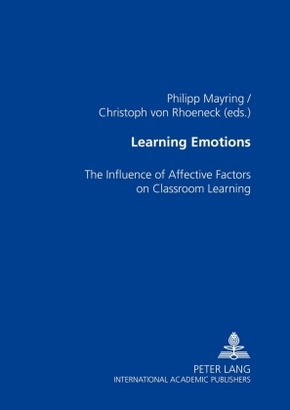Learning Emotions - The Influence of Affective Factors on Classroom Learning
| Verlag | Peter Lang |
| Auflage | 2003 |
| Seiten | 206 |
| Format | 14,8 x 1,1 x 21,0 cm |
| Gewicht | 280 g |
| Artikeltyp | Englisches Buch |
| ISBN-10 | 3631399030 |
| EAN | 9783631399033 |
| Bestell-Nr | 63139903A |
Educational psychology and educational practice is dominated by behavioristic and cognitive approaches. This reader brings together new research results which underline the important role of emotion in learning. Anxiety, joy, pride, boredom of the learner influences the learning outcome. Research teams from Europe and the U.S.A. present their results.
Inhaltsverzeichnis:
Contents: Ph. Mayring: Introduction: Importance of affective factors for learning - T. Goetz/A. Zirngibl/R. Pekrun/N. Hall: Emotions, Learning and Achievement from an Educational-Psychological Perspective - G.H.E. Gendolla: Mood Effects and Effort Mobilization in Learning: Theory and Experimental Evidence - P. Häussler: Emotional aspects and the role of interest and self concept in learning physics - M. Laukenmann/C.v. Rhöneck: The Influence of Emotional Factors on Learning in Physics Instruction - S. Fuß: The Influence of Parental Behavior on Students' Motivation and Achievement: An Empirical Study in German Secondary School - M. Gläser-Zikuda/Ph. Mayring: A qualitative oriented approach to learning emotions at school - T. Hascher: Well-being in school - Why students need social support - D.R. Hancock: Influencing Students' Achievement in Eighth Grade German and U.S. Classrooms - W. Dee Nichols/J.P. Jones: Exploring the Relationship Between Eighth Graders' Emotional Development, Their Perception of Learning and Their Teachers' Instructional Strategies as it relates to Goal Orientation - M. Hänze: Productive functions of emotions in classroom learning - C.v. Rhöneck/H. Melenk: The influence of emotions on classroom learning and consequences for teaching.
Rezension:
«...the book fills an important gap in the science education literature. The result of these studies are important and have implications for educational researchers and practitioners.» (Saouma Boujaoude, International Review of Education)

